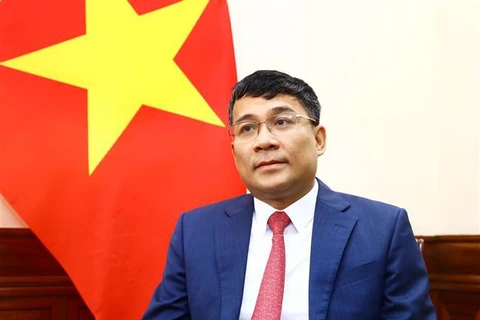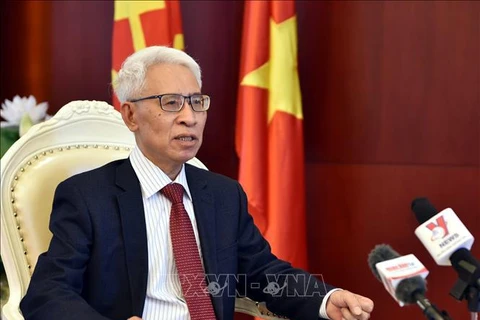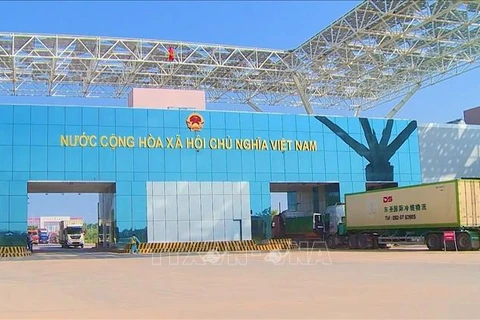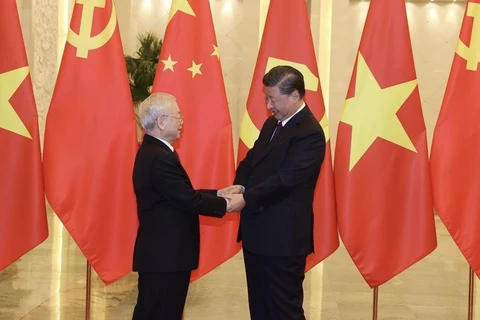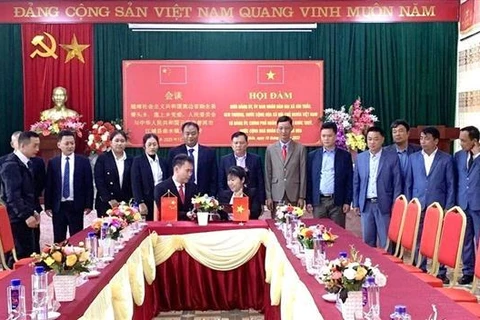Hanoi (VNA) – Chinese Ambassador to Vietnam Xiong Bo has granted an interview to the press about the State visit to Vietnam by General Secretary of the Communist Party of China (CPC) Central Committee and President of China Xi Jinping from December 12-13.
Reporter: 2023 marks the 15th anniversary of the Vietnam-China comprehensive strategic cooperative partnership. In recent years, the bilateral relationship has maintained positive momentum. How do you comment on the progress of ties between the two Parties and countries in recent years?
Ambassador Xiong Bo: First of all, I want to emphasise that the relationship between the two Parties and two countries is very special. Both of our countries are socialist nations led by the Communist Parties, and are friendly neighbours with contiguous mountains and rivers. It can be said that the two neighbouring countries full of the above-mentioned characteristics are rare in the world.
When we talk about the relationship between the two Parties and two countries, we cannot help remembering the historical ties between the two Parties and nations in the past. Since the mid-20th century, during the prolonged struggle for national independence and liberation, the two countries always stood shoulder to shoulder, jointly fought and supported each other, and formed a durable friendship. President Ho Chi Minh and President Mao Zedong made extremely important contributions to building a strong foundation for the friendship between the two countries.
"The Vietnam-China friendship is both comradeship and brotherhood," which vividly demonstrates the relationship between the two Parties and countries. This is also a statement made by President Ho Chi Minh.
In recent years, under the strategic leadership of General Secretary Xi Jinping and General Secretary Nguyen Phu Trong, the relationship between the two Parties and countries, and the China-Vietnam comprehensive strategic cooperative partnership have continuously achieved new progress. Especially last year, right after the successful conclusion of the 20th National Congress of the Communist Party of China, General Secretary of the Communist Party of Vietnam (CPV) Central Committee Nguyen Phu Trong accepted the invitation to visit China. General Secretary Nguyen Phu Trong was the first foreign leader to be invited to visit China, and this visit was very successful. It was also a visit of historical significance. The two Party General Secretaries reached common perceptions on the promotion of China-Vietnam relations to a new height and defined the direction for the development of the bilateral relations in the new period.
Political trust between the two sides has been deepened following General Secretary Nguyen Phu Trong’s visit to China. This year, senior leaders of the two Parties and two countries have maintained close strategic exchanges.
President Vo Van Thuong travelled to China to attend the 3rd Belt and Road Forum for International Cooperation. Prime Minister Pham Minh Chinh visited Tianjin to attend the World Economic Forum. In September, PM Pham Minh Chinh attended the China-ASEAN Expo, and permanent member of the CPV Central Committee's Secretariat Truong Thi Mai visited China in April. Members of the CPV Central Committee's Politburo and leaders of Vietnamese localities also visited China.
Recently, Politburo member, Director of the Office of Foreign Affairs Commission of the CPC Central Committee and Minister of Foreign Affairs Wang Yi visited Vietnam and co-chaired the 15th meeting of the China-Vietnam Steering Committee for Bilateral Cooperation. Vice Chairman of the National Committee of the Chinese People's Political Consultative Conference, Wang Yong also visited Vietnam.
The Secretaries of Party Committees of Chinese provinces and autonomous regions such as Guangxi, Yunnan and Hainan sequentially visited Vietnam.
Through high-level meetings and exchanges, leaders of the two sides exchanged views on important contents, learn from and consult with each other their experience in the Party building work and national management.
Trade and investment saw highlights in the relationship between the two countries.
The exchange and cooperation between the people of the two countries are vibrant. After both sides relaxed their pandemic prevention policies, people-to-people exchange quickly resumed. In the first 11 months of this year, the number of Chinese tourists visiting Vietnam exceeded 1.5 million.
Overall, since last year, the relationship between the two Parties and countries has maintained a very positive and robust development momentum. We are full of confidence in the development and future of the relationship.
Reporter: How does the upcoming visit hold significance to the bilateral ties, Mr Ambassador?
Ambassador Xiong Bo: It is the third visit to Vietnam by comrade Xi Jinping since the end of the 18th National Congress of the Communist Party of China in November 2012 in his capacity as the Party General Secretary. It is a reciprocal visit following General Secretary Nguyen Phu Trong's visit to China last year, and it marks the third mutual visit by leaders of the two Parties since 2015.
The consistent strategic leadership of the highest-ranking leaders of the two Parties is the greatest advantage and fundamental assurance for the development of the China-Vietnam relations. Regarding the timing of the visit, we must consider the current global context where unprecedented and rapidly evolving changes are occurring. In various regions, wars and conflicts are taking place, and in East Asia, the current peaceful and stable situation is highly valuable.
Looking at the internal situation of the two countries, currently, the socialist construction efforts of both countries are entering a new journey and a new stage of development. I believe that the highest leaders of the two Parties will have many opinions to exchange on this matter.
The upcoming visit presents a very important opportunity for leaders of both countries to maintain and enhance strategic exchanges in the new situation, on the back of the solid foundation of the comprehensive strategic cooperative partnership over the past 15 years. It aims to determine the new position of the bilateral relations in the new era, set a new direction for further development, and open up new prospects for cooperation in various fields. It will create new momentum for the sustainable development of the China-Vietnam relationship. In summary, it could be characterised as a new positioning, a new direction and new momentum.
Reporter: Can you tell what contents leaders of the two Parties and the two countries will discuss and what important agreements will be signed during this visit?
Ambassador Xiong Bo: First of all, both Parties take the pursuit of happiness for the people and the pursuit of progress for humanity as their important tasks. Relating to these two important contents, the two sides will inform each other of the latest developments of their respective Party and State building process and join in-depth discussions to deepen and further elevate the bilateral comprehensive strategic cooperative partnership in the new era. As I mentioned, the two sides will clearly determine the development direction of the bilateral relations in the new situation.
Senior leaders of the two countries will also compare notes on a range of important issues, including how to further deepen political, security, and economic-trade cooperation, people-to-people exchange, and joint work in multilateral mechanisms.
It is expected that the two sides will sign dozens of important cooperation documents in areas such as cooperation via Party channel, cooperation between agencies and localities, security-defence, justice, communication, and development connection, economy, trade and investment, digital economy, green development, import and export of agricultural products, irrigation, and maritime cooperation.
Leaders of the two countries will discuss international and regional situations of mutual interest. Therefore, this visit by Communist Party of China General Secretary and President of China Xi Jinping will make an important contribution to maintaining peace, stability and development in the region as well as the world, and it will certainly receive widespread attention from the international community.
Reporter: The highest-level leaders of the two Parties and the two countries have always maintained close exchanges in recent times. What important role does this play in the development of relations between the two countries?
Ambassador Xiong Bo: As I have mentioned, persisting in the strategic leadership of the two Parties’ top leaders for the development of relations between the two Parties and the two countries is the greatest advantage and the most fundamental guarantee. I think that this is also important experience in maintaining the healthy, stable and sustainable development of bilateral relations in recent years.
It can be said that every exchange between General Secretary Xi Jinping and his Vietnamese counterpart Nguyen Phu Trong is an important exchange of ideas and strategies between the two great politicians, theorists, and strategists of contemporary Marxism, playing a decisive guiding role in the development of relations between the two Parties and the two countries.
The traditional friendship between China and Vietnam, which was built and nurtured by President Ho Chi Minh and President Mao Zedong, is said to be a valuable common asset of the two countries.
I think that the close friendship between the two countries’ Party chiefs is also a valuable common asset of the two peoples. Both sides are looking forward to the upcoming visit to Vietnam by the Chinese leader./.

